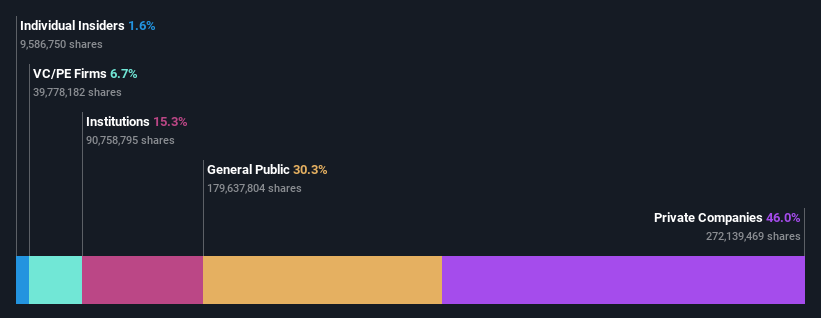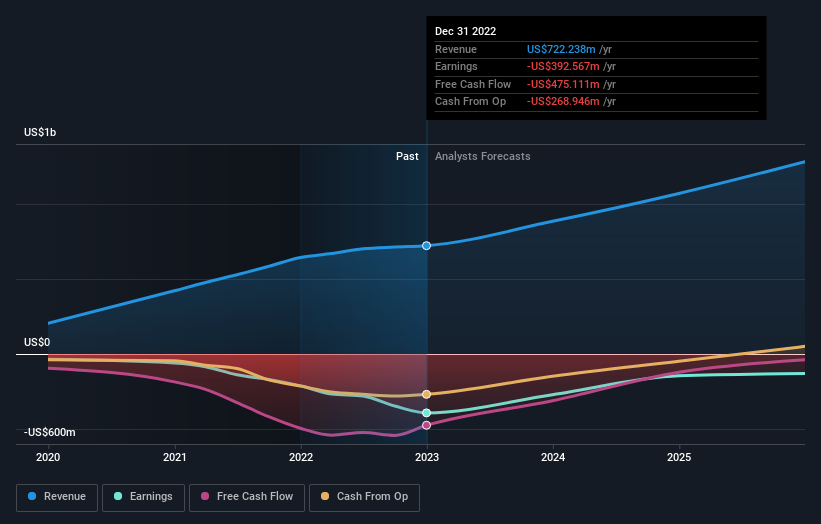Oatly Group AB's (NASDAQ:OTLY) market cap surged US$183m last week, private companies who have a lot riding on the company were rewarded
Key Insights
Oatly Group's significant private companies ownership suggests that the key decisions are influenced by shareholders from the larger public
The top 2 shareholders own 53% of the company
If you want to know who really controls Oatly Group AB (NASDAQ:OTLY), then you'll have to look at the makeup of its share registry. The group holding the most number of shares in the company, around 46% to be precise, is private companies. In other words, the group stands to gain the most (or lose the most) from their investment into the company.
As a result, private companies collectively scored the highest last week as the company hit US$1.4b market cap following a 16% gain in the stock.
Let's delve deeper into each type of owner of Oatly Group, beginning with the chart below.
See our latest analysis for Oatly Group
What Does The Institutional Ownership Tell Us About Oatly Group?
Many institutions measure their performance against an index that approximates the local market. So they usually pay more attention to companies that are included in major indices.
As you can see, institutional investors have a fair amount of stake in Oatly Group. This implies the analysts working for those institutions have looked at the stock and they like it. But just like anyone else, they could be wrong. If multiple institutions change their view on a stock at the same time, you could see the share price drop fast. It's therefore worth looking at Oatly Group's earnings history below. Of course, the future is what really matters.
We note that hedge funds don't have a meaningful investment in Oatly Group. The company's largest shareholder is China Resources Verlinvest Health Investment Ltd., with ownership of 46%. With 6.7% and 6.2% of the shares outstanding respectively, Blackstone Inc. and Baillie Gifford & Co. are the second and third largest shareholders. Furthermore, CEO Toni Petersson is the owner of 1.5% of the company's shares.
To make our study more interesting, we found that the top 2 shareholders have a majority ownership in the company, meaning that they are powerful enough to influence the decisions of the company.
Researching institutional ownership is a good way to gauge and filter a stock's expected performance. The same can be achieved by studying analyst sentiments. There are plenty of analysts covering the stock, so it might be worth seeing what they are forecasting, too.
Insider Ownership Of Oatly Group
The definition of company insiders can be subjective and does vary between jurisdictions. Our data reflects individual insiders, capturing board members at the very least. Company management run the business, but the CEO will answer to the board, even if he or she is a member of it.
Most consider insider ownership a positive because it can indicate the board is well aligned with other shareholders. However, on some occasions too much power is concentrated within this group.
Our most recent data indicates that insiders own some shares in Oatly Group AB. The insiders have a meaningful stake worth US$22m. Most would see this as a real positive. Most would say this shows alignment of interests between shareholders and the board. Still, it might be worth checking if those insiders have been selling.
General Public Ownership
With a 30% ownership, the general public, mostly comprising of individual investors, have some degree of sway over Oatly Group. While this group can't necessarily call the shots, it can certainly have a real influence on how the company is run.
Private Equity Ownership
Private equity firms hold a 6.7% stake in Oatly Group. This suggests they can be influential in key policy decisions. Some might like this, because private equity are sometimes activists who hold management accountable. But other times, private equity is selling out, having taking the company public.
Private Company Ownership
Our data indicates that Private Companies hold 46%, of the company's shares. It's hard to draw any conclusions from this fact alone, so its worth looking into who owns those private companies. Sometimes insiders or other related parties have an interest in shares in a public company through a separate private company.
Next Steps:
It's always worth thinking about the different groups who own shares in a company. But to understand Oatly Group better, we need to consider many other factors. Case in point: We've spotted 3 warning signs for Oatly Group you should be aware of, and 1 of them is a bit concerning.
If you would prefer discover what analysts are predicting in terms of future growth, do not miss this free report on analyst forecasts.
NB: Figures in this article are calculated using data from the last twelve months, which refer to the 12-month period ending on the last date of the month the financial statement is dated. This may not be consistent with full year annual report figures.
Have feedback on this article? Concerned about the content? Get in touch with us directly. Alternatively, email editorial-team (at) simplywallst.com.
This article by Simply Wall St is general in nature. We provide commentary based on historical data and analyst forecasts only using an unbiased methodology and our articles are not intended to be financial advice. It does not constitute a recommendation to buy or sell any stock, and does not take account of your objectives, or your financial situation. We aim to bring you long-term focused analysis driven by fundamental data. Note that our analysis may not factor in the latest price-sensitive company announcements or qualitative material. Simply Wall St has no position in any stocks mentioned.
Join A Paid User Research Session
You’ll receive a US$30 Amazon Gift card for 1 hour of your time while helping us build better investing tools for the individual investors like yourself. Sign up here

 Yahoo Finance
Yahoo Finance 

